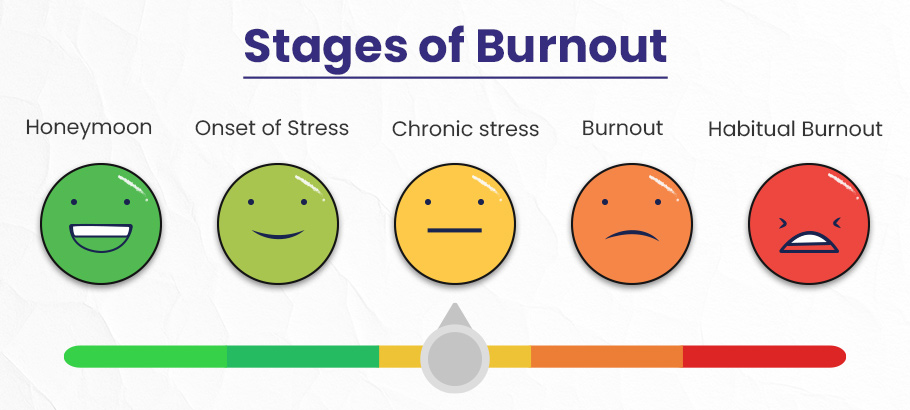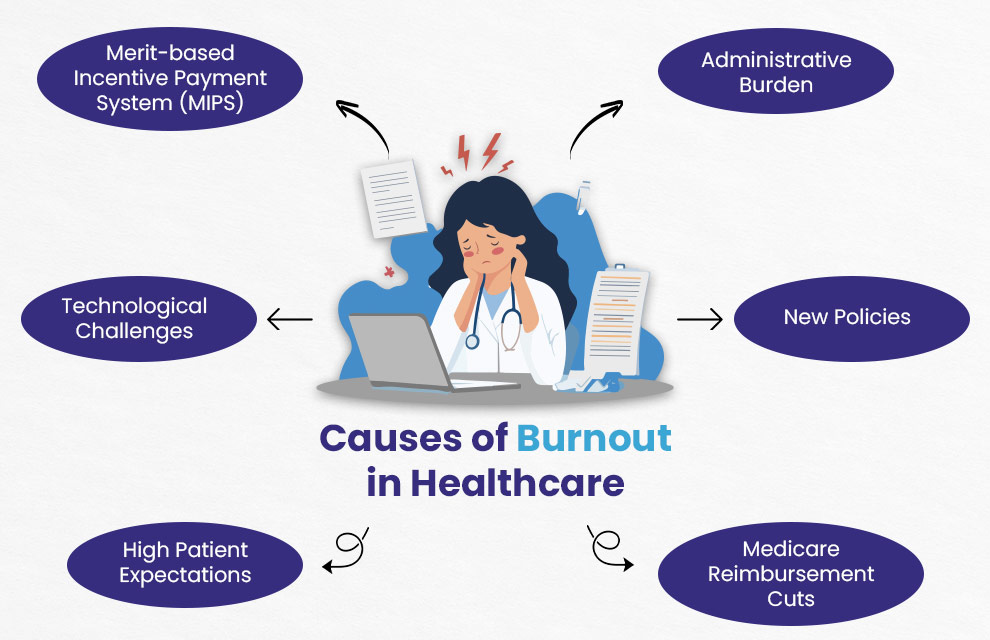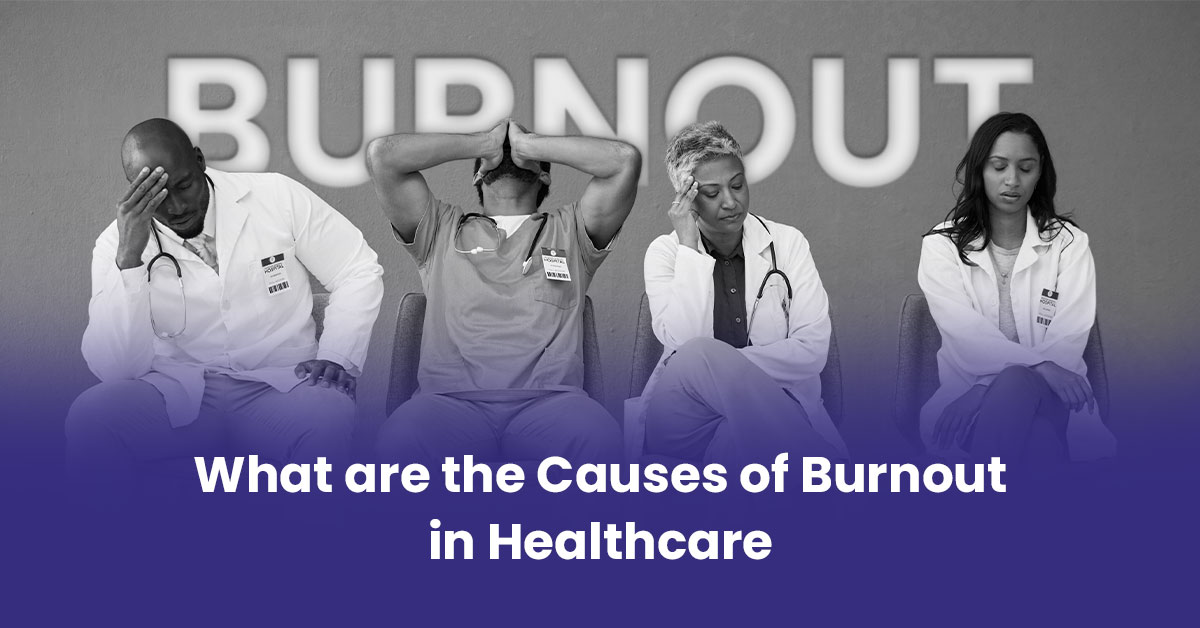In today’s busy life, it is hard to keep your mind healthy, especially when you have many things to do each day. Furthermore, working without breaks and facing other problems can make you feel tired, affect your mental health, and cause burnout.
Burnout happens when a person feels very tired in their mind or emotions because of too much stress for a long time. Indeed, all jobs can be stressful and exhausting sometimes, but the burnout rate in healthcare is very concerning. Each year, many health workers leave their jobs completely.
Today, we will focus on our healthcare workers. We will talk about the main reasons for burnout in healthcare and how to prevent it.
The healthcare industry is very important for our society. Workers in this field do their best to keep everyone healthy and active. However, there comes a time when they also need our help and care.
As medical business operations manager, Wyatt Butler wisely states, “In the fight against burnout, we must remember that even the strongest among us need a moment to breathe.”
This blog will explain why burnout happens in healthcare, the stages of burnout, and how to solve it. Ultimately, this is to support our important healthcare workers.
Burnout in Healthcare
Many healthcare workers have felt more tired and stressed during the pandemic. During COVID-19, health workers worked hard to take care of everyone. They faced a lot of work day and night, which led to many feeling emotionally drained and burned out.
Even after the pandemic, health workers have become ever more fatigued. This is a serious concern for all of us. It can hurt the mental health of health workers and also affect their services, which can put patient care at risk.
According to the World Health Organization, burnout is an occupational phenomenon defined as a “syndrome conceptualized as resulting from chronic workplace stress that has not been successfully managed.”
Also, burnout is related to work and should not be used for personal stress or other life situations.
Burnout has three dimensions or significant symptoms.
- The practitioner is always exhausted.
- They have started keeping their distance from everyone and experiencing a lack of interest.
- Their quality of work and efficiency are going down.
Beat Burnout for Good…
Let Us Shoulder the Load!
Burnout is the worst. But it doesn’t have to be inevitable! Offload the monotony of medical admin and focus on higher-level care.
Stages of Burnout in Healthcare
Burnout is a whole process from which a person goes without realizing and ignoring the fact their mental health is affected. As Wyatt notes, “Burnout creeps in silently, and if we don’t pay attention, it can overshadow even our brightest moments.”
According to a study, burnout among health workers has increased from 2018 to 2022 relative to other industries.
The burnout rate among health workers increased in 2022, i.e., 46% compared to 32% in 2018, and is still increasing.
Teagan Stewart, a healthcare coding expert, emphasizes, “In our quest to care for others, we must also prioritize our own well-being; it’s not a weakness, but a necessity.”
It is necessary to address this issue now. There are five stages of burnout from which an individual goes and loses mental health. Let’s discuss them one by one below.

Honeymoon Phase
The Honeymoon Phase is full of excitement. When you start a new job, you become so excited about the job and try to perform various responsibilities or tasks to create a good image in the organization, even out of excitement.
Onset of Stress
When the honeymoon phase ends, you start to feel some work pressure. You may have committed so much earlier, and now you find it hard to meet the expectations, but try your best and avoid other thoughts. It is the onset of the stress stage. At this stage, some days are lively and quite stressful. You start losing your focus, and your excitement vanishes.
Chronic Stress
Now, you have become frustrated over the workload. Stress has become so continuous. It will affect your productivity and your commitment to meeting particular deadlines. You will become isolated from achieving your targets, and your relations with colleagues, friends, or family might be disturbed.
Burnout
This phase is when you no longer find joy in anything. You will hit your limit and maybe will have issues like a sad stomach, insomnia, and intense headaches. You may start doubting yourself and feel useless. As Butler states, “When joy fades from your work, it’s a sign that you need to pause and reflect.” Family members and friends can apparently observe the change in your behavior at this stage.
Habitual Burnout
Habitual burnout is when you leave yourself untreated, and then burnout becomes a permanent thing in your life. It can lead to anxiety and depression and can cause fatigue, either mental or physical. Teagan Stewart adds, “Ignoring the signs of burnout only leads to deeper issues; it’s crucial to seek help before it becomes a habit.” It is an alarming stage, and it can change your personality, and you will not be able to do your work or job anymore.
Causes of Burnout in Healthcare
Burnout has become a noteworthy issue in health workers, and it can significantly affect the quality of work and their mental health. Hundreds of reasons at work can cause burnout, such as lack of control or appreciation, workloads, and not meeting specific requirements. Below, we have discussed some prominent causes of burnout among health workers.

Administrative Burden
Administrative burdens are the leading cause of burnout in health workers. As Dr. Jennifer L. H. says, “Burnout is not just about being tired; it’s about feeling overwhelmed by the relentless administrative tasks that take us away from patient care.” When a health worker spends more time on administrative tasks than on taking care of patients, they feel frustrated. Doing paperwork, managing documents, and following up can be very tiring and take a lot of time and energy. Too much paperwork can make health workers forget about taking care of patients and feel unhappy with their jobs.
For example, submitting a medical claim takes a lot of time. First, you need to find the right codes. Then, you have to fill out all the documents and paperwork. Finally, you submit the claim with the correct coding and billing. Dr. Mike G. adds, “The constant demands of documentation and the pressures of electronic health records (EHR) contribute significantly to physician burnout.” This is not the end—following up or handling claim denials is challenging, especially when a healthcare worker has a lot to do already.
When a health worker has to do many different tasks, their job becomes very difficult. Each day, you see many patients. After each visit, you put the patient information into the computer, schedule their next appointment, and upload their current procedures. At some point, you will feel very tired from these heavy tasks and may experience burnout.
New Policies
The healthcare industry is always changing. New rules, procedures, and codes come out often. This can be very stressful for healthcare workers. They have to manage these changes along with their usual patient care duties.
As new diseases appear, healthcare workers need to learn new coding systems, such as CPT codes, to correctly document and bill for patient treatment. In 2020, during the COVID-19 pandemic, many new codes were made just for coronavirus testing and treatment. Healthcare workers needed to learn these new codes fast while also handling the increased work during the pandemic.
Similarly, when outbreaks happen, like the Measles Outbreak of 2024, healthcare facilities quickly work to learn new rules and coding procedures. Workers need to quickly adjust to new protocols and documentation standards. This ongoing change is tiring for the healthcare facility, thus causing burnout among healthcare workers.
So the added stress of extra workload and responsibility under emergency conditions can result in burnout. Healthcare workers can only handle a limited amount of change at one time before they feel drained.
Technological Challenges
Electronic health records (EHRs) and other healthcare software were created to help healthcare workers do their jobs more easily. But many find these new technologies challenging to use. The systems are often hard to use and clunky, needing a lot of time and work to put in patient information. This can increase the already large workload of healthcare workers.
Additionally, many doctors and nurses did not grow up with this kind of technology. Baby Boomers and even Millennials can struggle to adapt to modern healthcare software. For those used to paper charting systems, the switch to EHRs can be hugely stressful. Having to learn these new skills later in their careers, while still seeing a full load of patients, leaves many feeling overwhelmed.
High Patient Expectations
Today, patients expect more from the healthcare system. Patients want good care and personal attention from their doctors. But, trying to meet these high expectations can cause a lot of stress and exhaustion for healthcare workers.
One main reason for this is the change from a fee-based care model to a value-based care model. Before, healthcare providers received payment for each patient they treated. Now, they are assessed and compensated according to the care quality they give. Healthcare providers need to spend more time with each patient to make sure they follow the quality standards of the healthcare industry.
But, when healthcare providers spend more time with each patient, they can see fewer patients in one day. This can greatly affect their financial goals because they might not earn as much money as they did with the fee-based care model.
Also, the need to keep a good image and meet patients’ needs can make healthcare workers put in more hours and work harder. This can cause stress and tiredness, as they might feel too much pressure and not appreciated.
Wyatt reflects, “In value-based care, the drive for exceptional patient outcomes can sometimes overwhelm physicians, as seen in the stress of meeting stringent performance metrics.”
To maintain a balance between providing quality care and meeting financial goals, healthcare providers may feel like they are constantly juggling competing priorities. This can lead to feelings of dissatisfaction and a lack of fulfillment in their jobs.
Merit-based Incentive Payment System (MIPS)
The Merit-based Incentive Payment System, or MIPS for short, is also a big cause of burnout in healthcare. MIPS ties doctors’ payments to how well they do on certain measures of quality, cost, and more. To get the full 9% bonus payment, doctors have to score very high. This puts tons of pressure on them.
Doctors end up spending lots of extra time on paperwork and tasks that have nothing to do with helping patients. They have to do this just to get a good MIPS score. All the focus on numbers and scores takes away from real patient care, which is what most doctors went into medicine for.
On top of that, MIPS rules are super confusing and change every year. Trying to keep up causes lots of stress and anxiety. Doctors feel like they can’t win no matter how hard they try. In the end, MIPS leads to frustration, exhaustion, and burnout. It makes doctors feel like widgets in a factory rather than real human beings.
Medicare Reimbursement Cuts
Medicare reimbursement cuts are also a major driving force behind the burnout crisis in healthcare.
You see, instead of receiving raises or bonuses, healthcare workers have actually been earning less money from insurance companies for the past five years. And get this: by 2025, their pay is expected to drop by another 2.8% compared to 2024! That’s a pretty big cut, going from $36.09 in 2020 to $32.36 in 2025 per patient they see.
Now you might be thinking, “Well, they can just see more patients then, right?” But here’s the catch – they’re already being pushed to see more patients in less time to make up for the lower payments. And doing that affects their performance scores under the MIPS.
Basically, MIPS measures the quality of care they provide, and if they rush through too many patients, their scores drop. And low MIPS scores mean even lower payments down the line. It’s a vicious cycle.
On top of that, having to cram in more patients every day takes a serious toll on their mental and physical health. They’re stretched thin, overworked, and constantly stressed out.
So you can imagine how demoralizing and demotivating it must feel for healthcare workers. They’re putting their nose to the grindstone, sacrificing their well-being, and what do they get in return? Pay cuts, year after year. It’s no wonder they end up feeling burnt out and disillusioned with their jobs.
EHR a Nightmare?
Wake Up to Our Solutions! ✨
We get how frustrating EHR systems can be. Like why is simple data entry so needlessly complex? But with our smooth EHR and practice management solutions, you’ll breeze through patient info entry and access the data you need with ease.
5 Effective Ways to Manage Work Stress
We all understand that at some point, work becomes a disaster for our mental health as we lose our work-life balance, and excessive workload causes us stress that leads to burnout and further anxiety or depression. But we should know that help is available anytime, anywhere.
There are many ways to reduce stress that leads to a healthy lifestyle and healthy mind. So, let’s discuss a few of them and make sure to implement them in your daily routine.

1). Exercising
As a healthcare provider, it is important to prioritize your own health and well-being, especially when dealing with the daily stressors of the job. One of the best practices to keep yourself healthy, happy, and motivated is through exercising.
In fact, according to a university survey of 185 students, doing physical activity twice a week helps in managing stress. This could include anything from going for a jog, hitting the gym, or even taking a yoga class.
In addition to managing stress levels, exercising and other physical activities can also result in good, healthy sleep, which is essential for healthcare providers who need to be well-rested and alert on the job.
But why stop at just exercising? Combining physical activity with mindfulness practices like yoga or meditation can help your mind think positively and relax your muscles. And don’t underestimate the power of a simple morning walk – even just 15 minutes can leave you with fresh thoughts and offer a fresh start to your day.
2). Outsourcing your Work
In today’s fast-paced world, working smarter, not harder, is the key to success. When you hire someone else to handle your administrative work, like medical billing, coding, accounting, managing revenue, and submitting claims, you can save important time and energy. This allows you to focus on what is really important – giving great care to your patients.
Partnering with a good medical billing company can make a big difference. These professionals know their work well. They are committed to making sure your administrative tasks are done quickly and correctly. When you outsource these tasks, you can make your work easier and feel less stress.
One main benefit of outsourcing is that it helps you get back your time. Rather than spending many hours on administrative tasks, you can use that important time for your health, continuing education, or just taking a needed break. This new balance can help stop burnout and support a healthier, more lasting work-life situation.
Also, outsourcing agencies focus on keeping high efficiency and quality. They use teams of skilled workers who know the latest rules and best ways to do things in the industry. They have the skills and resources to handle your administrative tasks well.
Outsourcing does not have to be very expensive, despite what many people think. Many trusted agencies provide affordable services, so you can enjoy the advantages of outsourcing without hurting your budget.
3). Seeking Counseling
Getting counseling is a great way to fight burnout and get back your love for healing. Rather than isolating yourself, talk to coworkers who understand what you are going through. Dividing duties more evenly, changing schedules for personal time, and discussing frustrations can help a lot.
You might not want to show your feelings or say that you are struggling. But the hallmark of a great healthcare provider is recognizing when they need care too. Counseling helps you deal with difficult experiences, handle worries, and regain perspective. You need to take care of yourself sometimes if you want to help others.
Take care of yourself by seeking counseling now. This can help you avoid burnout that can harm your health and job. Your coworkers and patients rely on you to perform well. Asking for help shows bravery and smart thinking. It will help you keep giving great, caring support while also taking care of yourself.
4). Having Enough Sleep
Not getting enough sleep can make the high stress levels that healthcare workers feel even worse. If you do not get enough rest, your mind has a hard time recovering. You may start to overthink things, and your health can get worse. Doctors say adults should sleep 6 to 8 hours each night for good health and brain function. There are several effective ways healthcare workers can promote sufficient sleep:
First, make a space that is good for sleeping. Dim the lights, play calm music, turn off electronic devices, and make sure the bedroom is quiet, cool, and cozy. This tells the brain and body that it is time to relax and rest.
Next, create a regular routine before bed. This can include taking a warm bath, reading a book, or doing some light stretches. These activities help you move from being awake to sleeping. Do not do things that make you excited, like exercising, working, or using screens, right before you go to sleep.
In addition, mindfulness activities such as meditation or deep breathing can help lower stress and calm busy thoughts. Doing these during the day or before sleep can reduce stress and racing thoughts that disrupt sleep. Other lifestyle habits, such as exercising regularly, getting sunlight, drinking less caffeine, and eating healthy foods, also help improve sleep quality.
5). Taking a Break
Excessive work and the same robotic routine for days make you exhausted and frustrated. In that case, a short vacation to the beach, mountains, island, or anywhere you like can help.
Take your annual leaves and plan a tour with your family or friends to have some quality time with loved ones. It will definitely help you start fresh with a positive mind set.
Healthcare Heroes Deserve Better!
Healthcare is tough enough without burnout bogging you down! Our comprehensive medical outsourcing services will refresh and empower you to do what you do best.
Your Mental Health is Important To Us
Stressed out? Overwhelmed? Feeling like you’re drowning in paperwork? You’re not alone.
As a healthcare professional, you already carry the weight of the world on your shoulders. Long hours. Endless paperwork. Nonstop stress. You got into this field to help people, not to get buried under a mountain of insurance claims and billing statements.
But what if there was a lifeline? A partner to lighten your load so you can get back to what matters most – patient care.
At BellMedEx Medical Billing Company, we’re that partner. Our team of 1200 medical billing experts handle the tedious paperwork so you don’t have to. We take on insurance claims, medical coding, billing statements, and more. All the frustrating busywork that’s burning you out? We’ve got you covered.
With BellMedEx, you get:
- More time for patient care. Increased job satisfaction. And less stress.
- 99.99% clean claim acceptance rates to maximize reimbursements.
- Cost-effective services that boost your bottom line.
- Guaranteed 75+ MIPS score to avoid penalties.
- Billing and coding done right the first time – no denials or appeals!
Don’t get lost in too much paperwork. Get back your love for healing. BellMedEx provides the support you need to keep going. We will take care of the billing work, so you can focus on what you love about being a healthcare professional – curing people.





